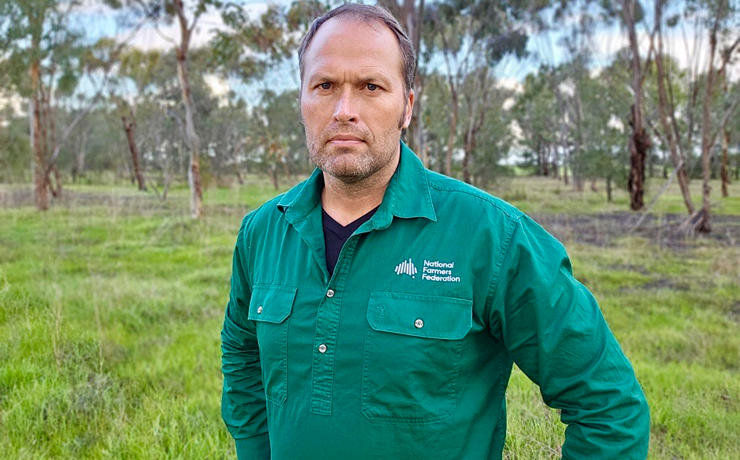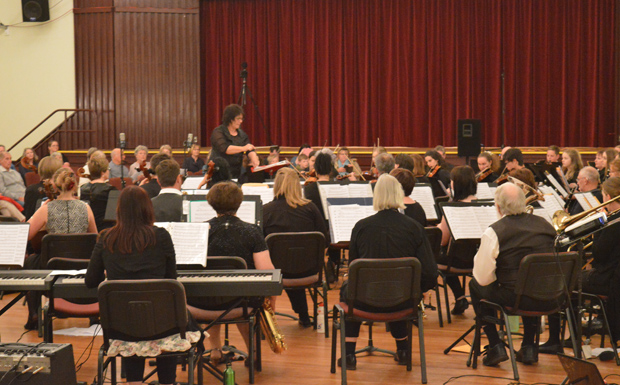
October 26, 2023
Newly installed National Farmers Federation president David Jochinke has launched a broadside against the Federal Government on his first day on the job.
Speaking at the NFF’s national conference in Canberra, Mr Jochinke called on MPs to stand up against policies which he said threatened “to slash billions from farm production”.
“Farmers have always put food on the table for Australians and clothes on our backs, but decisions are being made in Canberra that will make it harder to do,” Mr Jochinke said.
“They’re taking away the water, land and workers needed to grow food. That means fewer farmers doing what they do and when farmers grow less, everyone pays more,” he said.
Mr Jochinke launched a national NFF campaign, “Keep Farmers Farming”, which will focus on issues such as water buybacks in the Murray-Darling Basin; the proposed ban on live sheep exports; worker shortages on farms; environment laws; transmission lines and competition policy.
The launch follows an NFF survey of more than 1600 farmers which revealed falling confidence in the farming sector.
The survey found just over half (54.3 per cent) of farmers thought Federal Government policies were harming the industry, while 31.2 per cent thought the government was doing a good job for farmers.
Mr Jochinke urged farmers and consumers to unite behind the NFF campaign and show their support by signing an open letter to the Prime Minister, contacting their local MP or making a donation.
“In the coming months, decisions by the Federal Government threaten to shave billions off farm production. We need support to ensure we have the right policies that help keep farmers farming,” he said.
The “Keep Farmers Farming” campaign aims to:
- Block the Water Amendment (Restoring Our Rivers) Bill which would lift the cap on water buybacks in the Murray-Darling Basin;
- Force the government to abandon plans to ban live sheep exports to the Middle East;
- Force a “shake-up” of competition laws “to secure a fair deal for consumers and farmers”;
- Urge the government to create a dedicated visa pathway for agricultural workers;
- Urge the creation of a mandatory code of conduct for transmission line projects; and
- Change the Environment Protection and Biodiversity Conservation Act “to maintain productive land use”.
* * *

Nationals leader and Member for Maranoa David Littleproud backed the NFF campaign, saying the organisation was “desperately trying to save farming from a Labor government that had torn up farming confidence”.
He said Mr Jochinke had given a dire warning that farming was in the fight of its life.
“It has taken just 18 months for Agriculture Minister Murray Watt and the Prime Minister (Anthony Albanese) to lose the confidence of the agriculture sector,” Mr Littleproud said.
“Our farmers are under siege. NFF’s public campaign, ‘Keep Farmers Farming’, is an embarrassment for Minister Watt and the Albanese Labor Government.
“Every single Australian is feeling the impact of the pain and hurt being put on to farmers, because the end result of Labor’s bad policies are families being forced to pay more for food at the checkout.
“Farmers are being punished by Labor in almost every possible area.”
He pointed to the new biosecurity levy, introduced in the May Federal Budget, which he described as a “fresh food tax”.
The Budget promised an extra $1 billion to ramp up Australia’s biosecurity measures but it came with a sting, a new producer levy from July 2024 set at 10 per cent of 2020-21 levy rates.
At the time, AgForce said this would mean a grass-fed cattle producer would pay an extra 50 cents per head and a cotton producer would pay an extra 22.5 cents per 227kg bale, on top of their current levy payments and their own on-farm biosecurity management costs.
“It is unfathomable the Labor government would ask farmers pay for the biosecurity risks of international importers from other countries,” Mr Littleproud said.
Mr Littleproud also pointed to the scrapping the Agriculture Visa, changes to the Pacific Australia Labour Mobility (PALM) scheme, the proposed ban on live sheep exports and water buybacks.
“Labor’s reckless race to 82 per cent renewables by 2030 means 28,000km of transmission lines will rip up native vegetation and prime agricultural land,” he said.
“Labor’s ideology is putting our food and fibre production at risk. As well as ripping up agricultural land, chopping down thousands of hectares of native bushland and pristine farmland for wind farms is senseless.”
Mr Littleproud said potential Cultural Heritage laws would also put farmland at risk.
























If David Littleproud believes that “as well as ripping up agricultural land, chopping down thousands of hectares of native bushland and pristine farmland for wind farms is senseless” he clearly hasn’t visited the Coopers Gap Wind Farm.
It looks to me that the project was built with minimal impacts on the farmland it sits on. Even the farmers who initially disagreed with it are now happy with the boost in income they receive for hosting the wind turbines.
Clean power? More money for farmers? That sounds pretty good to me.